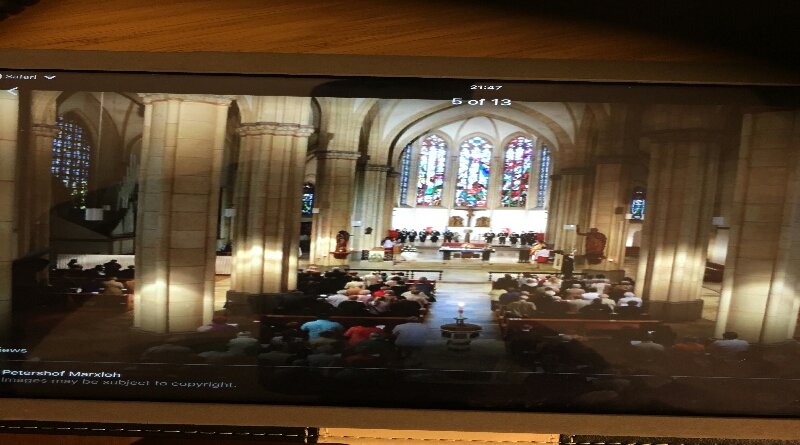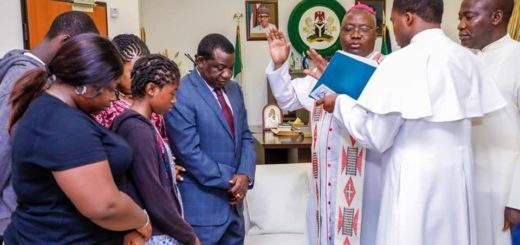Love is the supreme Law
1st Sunday, Year B, October 31, 2021, Homily at Sts. Simon and Jude Minor Seminary, Kuje, Abuja, by Archbishop I. A. Kaigama
Readings: Dt. 6: 2-6; Ps. 17(18): 2-4, 47, 51; Heb. 7: 23-28, Mk. 12: 28-34.
*Love is the supreme Law*
I am very delighted to visit you once more and to pray with you in the Minor Seminary community as you mark your patron feast day of Saints Simon and Jude. These two great saints were apostles of Jesus, called from different backgrounds to the vineyard of the Lord. The word apostle means “one sent”. On Mission Sunday last week, we were reminded that by our baptism we are called and sent to be missionaries of love and compassion, and the lives of your patron saints teach us that even the simplest of persons can become saints when they follow Jesus and His command of love.
This Sunday marks the beginning of our week-long celebration of the 40th anniversary of the ecclesiastical jurisdiction of Abuja. All parishes and chaplaincies have been asked to offer Masses in gratitude to God for the rapid growth of the Catholic faith in the Federal Capital Territory. The period is an opportunity for us as a family of God in Abuja to meet one another, get to know one another more closely, pray together and share our rich spiritual experiences and gifts. We thank God for the blessings of the past 40 years and we look forward with great hope to record even greater successes. Providentially, our anniversary comes at a time when Pope Francis is asking us to prepare for a synod on synodality, whose primary aim is to foster greater communion, participation and mission at all levels of our Church.
Moses exhorts in the first reading, “If you fear the Lord your God all the days of your life and if you keep all his laws and commandments which I lay on you, you will have a long life…” (Dt. 6:2). Keeping the commandments of God is the remedy to the world’s multidimensional problems. When on the other hand we deny that God is the Lord of history and He should have a special place in world affairs, and we molest, cheat or deprive others of their rights and privileges then injustice multiplies.
The Shema (hear O Israel, the Lord thy God is one Lord…) used to begin and conclude Jewish service in the Synagogue was a reminder to every devout Jew each morning that the Lord is the Lord of history, who can give long life and provide a land where milk and honey flow (cf. Dt. 6:2, 3). The love of God should therefore be with all our heart, meaning loving God in a manner that we give God our hearts to dwell in us and to enable us carry out good works through His grace present in us; with our soul, by submitting our entire being to God, knowing that whether alive or dead, we belong to Him (cf. Rom. 14:8) and with all our might, by channelling all our physical and spiritual strength in our service to God and neighbour.
The author of the letter to the Hebrews in the second reading shows how Jesus out of love made a sacrifice, once and for all of humanity even though He had no personal sins to atone for. He did this by being foremost in observing God’s commands of love and bringing the law to its fulfilment (cf. Mt. 5:17).
In the gospel, one of the Scribes came to Jesus and sought to know which is the first and most important of the commandments. Jesus in response reduced the 613 precepts multiplied from the Ten Commandments to love God and neighbour.
We are reminded in 1 John chapter 4 verse 20, “If anyone says, ‘I love God’ but hates his brother, he is a liar; for whoever does not love a brother whom he has seen cannot love God whom he has not seen’. Elsewhere, he teaches that a person who has no love is dead (1 Jn. 3:14). Again, he says: “Dear children, let us not merely say that we love each other; let us show the truth by our actions” (1 Jn. 3:18). Love conquers all things. You need to have it before you can give it (Nemo dat quod non habet).
The call to love our country is called patriotism, which should go beyond partisan political interests, parochial religious attitudes and ethnic loyalty. True patriotism must prompt us to beat our swords into ploughshares; leaders to do what is necessary to address national challenges with honesty, and the led not to allow themselves as easy recruits of violence and corruption. The major “sins” against our brand of patriotism are not the failure to carry out religious worship, but the tendency to take what is not ours; refusing to recognize the good in others simply because they are different; unjust governance that makes others strangers in their villages, states or the nation.
We in Nigeria must learn to consider others first. We suffer from what I call the “kwashiorkor of love”, as we fail to recognize the image of God in our fellow brother or sister because they do not belong to our ethnic group, social status or share our political views.
Pope Francis taught that our love for God should be an ‘unreserved donation’, to forgive without limits and in cultivating relations of communion and fraternity. When our motives and activities are driven by true love, we will experience a great rebirth. We will no longer have to debate over the distribution of scarce resources, advocate for good governance or defend human and property rights.
May our love of God and neighbour be generous and whole hearted; pure, genuine, and devoid of preconditions; to love even when it hurts.




